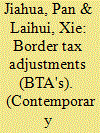| Srl | Item |
| 1 |
ID:
086723


|
|
|
|
|
| Publication |
2009.
|
| Summary/Abstract |
As the target commitment period under the Kyoto Protocol nears its end, further measures are under consideration by all the parties to the UNFCCC to have effective emission reduction that will not damage the economy. In order to set a post 2012 emission reduction target, as individual party as player in the clmate game requires others to make comparable commitments for reasons of environmental effectiveness and international competitiveness.
|
|
|
|
|
|
|
|
|
|
|
|
|
|
|
|
| 2 |
ID:
125472


|
|
|
|
|
| Publication |
2013.
|
| Summary/Abstract |
Concerns about the equity and efficiency of current allocation principles related to responsibility for carbon dioxide (CO2) emissions have been presented in the recent literature. The objective of this paper is to design a calculation framework for shared responsibility from the perspective of border tax adjustments. The advantage of this framework is that it makes the shared responsibility principle and border carbon taxation complementary to each other; these are important policies for reducing global CO2 emissions, but they are individually supported by developing and developed countries. As an illustration, the proposed framework is applied to data from China in 2007. The empirical results show that for the Chinese economy as a whole, changing from the production-based criterion to the shared responsibility approach would lead to an 11% decrease in its responsibility for CO2 emissions. Moreover, the differences observed between the production-based criterion and the shared responsibility approach are considerable in several sectors; for example, changing from the production-based criterion to the shared principle would lead to a 60% decrease in the responsibility of the textile sector.
|
|
|
|
|
|
|
|
|
|
|
|
|
|
|
|
| 3 |
ID:
140726


|
|
|
|
|
| Summary/Abstract |
There is under way a worldwide greening of industry, driven by the huge demand generated by China and India as emerging industrial giants whose growth cannot be accommodated by ‘business as usual’ fossil-fuelled development—for reasons having as much to do with energy security as concerns over global warming and climate change. While the role played in this process by fiscal and industry policies (e.g. carbon taxes and other market-based incentives) is well understood (even if not pursued currently in Australia), the potentially powerful leverage to be exercised by trade policy is under-recognised. There are some positive developments such as a proposed Environmental Goods Agreement being discussed in Geneva, while there are negative developments embodied in various bilateral and regional trade agreements such as the proposed Trans-Pacific Partnership (TPP) agreement, to which Australia has committed itself. There are rising levels of conflict over trade and climate change mitigation measures, in actions brought at the WTO against countries looking to promote green industries through measures like local content requirements being attached to foreign direct investment, or by countries imposing border tax adjustments against exporters who allegedly fail to implement carbon taxes. The issues involved are discussed in this paper and possible ways forward are proposed, along with some implications for Australia.
|
|
|
|
|
|
|
|
|
|
|
|
|
|
|
|